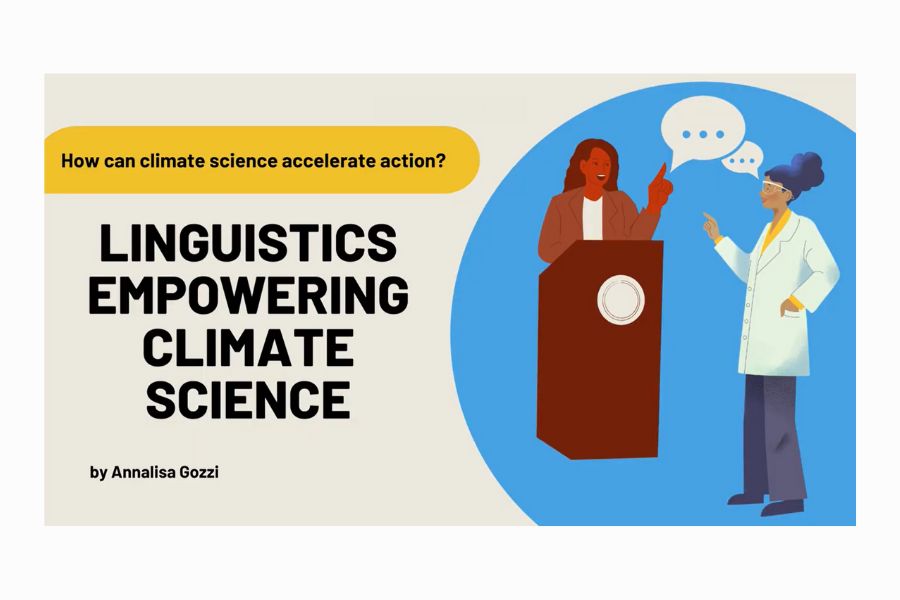
How Does Science Contribute to Climate Action? The Case of Climate Finance
28 July 2025
Climate Change Ethics: Population Control in the Latest IPCC’s Reports (AR4, AR5, AR6)
28 July 2025By Annalisa GOZZI
This essay reflects on the communication weaknesses of the Intergovernmental Panel on Climate Change (IPCC) and suggests ways to mend them for science to accelerate climate action. As in any instance of unsuccessful communication, the IPCC’s failure to spread a purpose-oriented message undermines the translation of information into action. Insights into how to better organize the redaction and the promotion of the reports can be drawn from linguistics, especially regarding semantics and syntax, behavioral economics, and neurolinguistics.
Firstly, regarding the semantics of the IPCC reports, the summaries for policymakers should introduce a preliminary glossary of disclaimers, on the premise that even though policymakers are acquainted with scientific jargon, many terms take up divergent meanings in common language vis à vis in climate science, thus triggering unconscious biases (Hassol, 2023). This glossary would act as an explicit, preventive warning by remarking the different meanings taken by the same word in context, e.g., it would highlight how the term ‘neutrality’ implies active reduction of emissions contrary to the connotation of ‘inaction’ entailed in political discourse.
Secondly, the syntax of the IPCC reports should be revisited by a team of expert linguists to ensure that emphasis is strategically placed within and among sections to foster action. Linguistics provides useful tools to package information in ways that imply specific implicit questions and thus guide receivers’ interpretation of the information, albeit unconsciously (Puglielli and Frascarelli). The following example illustrates the relevance of syntax in guiding interpretation. “Net zero CO2 emissions from the industrial sector are challenging but possible” (IPCC, 2022) answers a question focusing on difficulty whereas “Net zero CO2 emissions from the industrial sector are possible, albeit challenging” answers a different question, one of feasibility.
IPCC authors can be seen as “choice architects” (Thaler, Sunstein, and Balz, 2010). From the field of behavioral economics, choice architecture brings useful tools for devising a more effective presentation of adaptation and mitigation options. Jointly, linguistics and choice architecture could inform the structure of the reports nudging decisionmakers towards equitable, ambitious options. For instance, the space occupied by, and the emphasis placed on emissions offsetting and CO2 removal in the reports is problematic as it does not reflect the residual role these discourses should play in political agendas.
Finally, regarding outreach, insights can be drawn from neurolinguistics. Research (Caldwell-Harris, 2014) proves that speaking in a foreign language reduces emotional engagement which in turn impacts the reception of urgency of the information. Therefore, it would be beneficial if panelists at the IPCC press conferences provided their head statements in their mother tongue, trusting high-profile simultaneous translators to convey the content with all the relevant shades of meaning.
References
Caldwell-Harris CL. “Emotionality differences between a native and foreign language: theoretical implications.” Front Psychol. 2014 Sep 23; 5:1055. doi: 10.3389/fpsyg.2014.01055. Erratum in: Front Psychol. 2015; 6:437. PMID: 25295019; PMCID: PMC4172089.
Hassol, S. J. (2023). The Right Words Are Crucial to Solving Climate Change. Scientific American. (Caldwell-Harris, 2014)
Hayhoe, K. (2018). The most important thing you can do to fight climate change: talk about [Video] Ted Conferences. https://www.ted.com/talks/katharine_hayhoe_the_most_important_thing_you_can_do_to_fight_climate_change_talk_about_it.
IPCC, 2021: Summary for Policymakers. In: Climate Change 2021: The Physical Science Basis. Contribution of Working Group I to the Sixth Assessment Report of the Intergovernmental Panel on Climate Change [Masson-Delmotte, V., P. Zhai, A. Pirani, S.L. Connors, C. Péan, S. Berger, N. Caud, Y. Chen, L. Goldfarb, M.I. Gomis, M. Huang, K. Leitzell, E. Lonnoy, J.B.R. Matthews, T.K. Maycock, T. Waterfield, O. Yelekçi, R. Yu, and B. Zhou (eds.)]. Cambridge University Press, Cambridge, United Kingdom and New York, NY, USA, pp. 3−32, doi:10.1017/9781009157896.001.
IPCC, 2022: Summary for Policymakers [H.-O. Pörtner, D.C. Roberts, E.S. Poloczanska, K. Mintenbeck, M. Tignor, A. Alegría, M. Craig, S. Langsdorf, S. Löschke, V. Möller, A. Okem (eds.)]. In: Climate Change 2022: Impacts, Adaptation, and Vulnerability. Contribution of Working Group II to the Sixth Assessment Report of the Intergovernmental Panel on Climate Change [H.-O. Pörtner, D.C. Roberts, M. Tignor, E.S. Poloczanska, K. Mintenbeck, A. Alegría, M. Craig, S. Langsdorf, S. Löschke, V. Möller, A. Okem, B. Rama (eds.)]. Cambridge University Press, Cambridge, UK and New York, NY, USA, pp. 3-33, doi:10.1017/9781009325844.001.
IPCC, 2022: Summary for Policymakers. In: Climate Change 2022: Mitigation of Climate Change. Contribution of Working Group III to the Sixth Assessment Report of the Intergovernmental Panel on Climate Change [P.R. Shukla, J. Skea, R. Slade, A. Al Khourdajie, R. van Diemen, D. McCollum, M. Pathak, S. Some, P. Vyas, R. Fradera, M. Belkacemi, A. Hasija, G. Lisboa, S. Luz, J. Malley, (eds.)]. Cambridge University Press, Cambridge, UK and New York, NY, USA. doi: 10.1017/9781009157926.001.
‘L’écologie n’est Pas Un Consensus’ Avec François Gemenne, 2023. https://www.youtube.com/watch?v=w8urH5dexYY.
Puglielli, A., & Frascarelli, M. (n.d.). Tipologia linguistica: Riflessione sulle lingue e loro comparazione. Università degli Studi Roma Tre.
Thaler, Richard H. and Sunstein, Cass R. and Balz, John P., Choice Architecture (April 2, 2010). Available at SSRN: https://ssrn.com/abstract=1583509
Hayakawa, S., et al. (2017) “Thinking More or Feeling Less? Explaining the Foreign-Language Effect on Moral Judgment.” Psychological Science. DOI: 10.1177/0956797617720944


